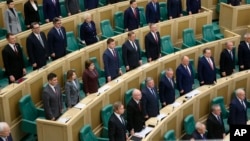Vyacheslav Volodin, speaker of the Russian State Duma and a close ally of Russian President Vladimir Putin, praised Putin for empowering Russian women.
Speaking at a March 27 Duma plenary session, Volodin said:
“Women received political rights in 1918, but they received real power only now, under President Putin and United Russia’s majority ... previously, all this was more for decoration.”
That is false.
The United Nations recommends that women hold at least 30% of political leadership positions so that women can influence decision-making. Russia is far below the U.N. threshold.
During Putin’s 24 years in power in Russia the political and social landscape in the country has been cleansed of influential figures perceived to potentially challenge his rule, including women.
Powerful female voices advocating democratic reforms, including politicians like Galina Starovoitova and Valeria Novodvorskaya, journalists like Anna Politkovskaya and Natalya Estemirova, and scores of others, have been silenced either by assassination or imprisonment.
In the six presidential elections held in Russia between 2000 and 2024, nine women declared their intention to run for office. The Kremlin-controlled Central Election Committee disqualified six of them. Of the three women presidential candidates, two have close ties with Putin, who has endorsed them.
Ella Pamfilova ran alongside Putin in the 2000 presidential elections, and in 2016, he appointed her chairman of Russia’s Central Election Commission — a position she still holds. The U.S. and EU imposed multiple sanctions against Pamfilova for staging fake plebiscites in Russian-occupied regions of Ukraine.
Ksenia Sobchak, the daughter of the late Anatoly Sobchak, who was St. Petersburg’s mayor and Putin’s boss from 1990 to 1996, ran in the 2018 presidential election as a candidate of the democratic opposition. Sobchak publicly admitted that Putin, a long-time family friend, asked her to run against him.
The Pamfilova-led Central Election Committee disqualified all four women who tried to register their candidacy on an anti-war platform in last month’s presidential elections, which most of the world saw as an undemocratic sham contest.
Volodin’s claim that Putin and his ruling United Russia party have empowered women in the legislative is equally false.
United Russia currently holds 323 of the Duma’s 450 seats.
Out of the 74 women who hold seats in the Duma, 63 are United Russia members.
Women chair four of the Duma’s 32 committees. They are Olga Kazakova, chair of the Committee on Enlightenment; Valentina Tereshkova, a former Soviet cosmonaut who chairs the Committee on Ethics; Elena Yampolskaya, who chairs the Committee on Culture; and Olga Timofeyeva, who chairs the Committee on Civil Society Development and Religious and Civic Groups Issues.
Valentina Matvienko, a long-time Putin ally, chairs the Federation Council, the upper house of Russia’s parliament, which has 169 senators, 36 of them women. Women chair two of the body’s 10 committees: Elena Perminova chairs the Committee on Social Policy and Liliya Gumerova chairs the Committee on Science, Education and Culture.
None of the women lawmakers have top seats on any of the key committees involved in decision-making on Russia’s foreign, national security and economic policies.
As of January 2023, Russia ranked 138th out of 186 countries in terms of representation of women in legislatures.
Only one of the 21 ministers in the Russian government is a woman. The share of women in executive bodies in Russia averages 25.8%, and in legislative bodies —16.8%.
In 1990, a resolution by the U.N. Economic and Social Council (ECOSOC) called for increasing the proportion of women in decision-making positions to 30% by 1995 and 50% by 2000.
The goal of having women in at least 30% of leadership positions was first put forward in the mid-1970s by American feminist Rosabeth Moss Kanter, who wrote that only “when the proportion of minority members reached about 30%, they were able to influence decision-making autonomously as a group.”
The 2021 study “Managerial patriarchy: how many women are in power in Russia,” published by the Utopia portal, found that women comprise only 25.8% of regional and territorial governments in Russia and that the share of women in regional assemblies was even lower at 16.8%.
Women in Russia had the lowest representation in the governments of the republics of the North Caucasus, St. Petersburg, the Altai Republic and Sverdlovsk region. The regional assemblies in the Ulyanovsk, Sverdlovsk and Omsk regions were among those that had the fewest women as members.
At the bottom of the list was the regional parliament of Chechnya, in which men occupy all 41 seats.
In the two largest Russian cities, the proportion of women is also far below the U.N.-recommended 30%. Only 19% of the officials in Moscow’s government are women, and the proportion is even lower in the executive bodies of St. Petersburg at 9%.





